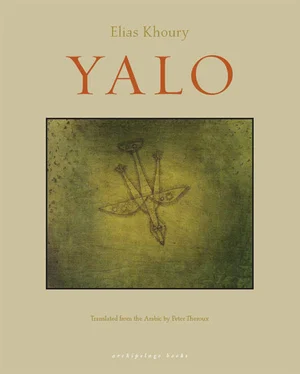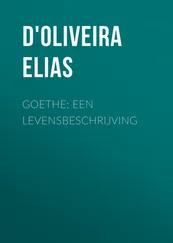“. .”
“Yes, yes, it’s all true, but a boat, no, we didn’t see boat lights coming from the sea.”
“. .”
“Me, no. Yes, I had a flashlight with me, only no, I did not use it to send signals.”
“. .”
“That’s what she said!”
“. .”
“She’s crazy, sir, yes, she is a crazy woman.”
“. .”
“What does it have to do with me, what she thought? I wanted her to learn things, and learn about life, and be convinced that love can work miracles.”
“. .”
“Yes, yes.”
“. .”
“After that she wanted to go, but I told her that she couldn’t.”
“. .”
“She’s a liar! I didn’t take money from her.”
“. .”
“She put a hundred dollars in my pocket and left. I discovered the money when I got home and I got very angry, and I meant to hide it for later — someday I’d marry her and spend the money on her.”
“. .”
“Yes, yes.”
“. .”
“No, there was no boat.”
“. .”
“I was wearing my black coat because I never take it off.”
“. .”
“I had the flashlight with me because it’s always in my pocket.”
“. .”
“Sir, that is just a habit from the war.”
“. .”
“And now I don’t feel whole, not only because you took my coat and consider it a piece of evidence, I’m lost because I don’t have my flashlight, so I feel blind, even in broad daylight. I only see right when my flashlight is on.”
“. .”
“When the guys came and grabbed me, the flashlight was about to go out.”
“. .”
“I swear to God, sir, it’s a habit, just a habit.”
“. .”
“No, no, that was not my intention.”
“. .”
“That’s just the way I am, that’s the way I’ve been all my life. I didn’t want anything. I swear to God I did not want anything from Shirin, right now even if she wanted me, I wouldn’t want her.”
“. .”
“I was thinking. . I wanted. .”
“. .”
“I don’t know — I don’t know.”
Yalo tried.
He listened to the questions and answered them, or tried to answer them, but the interrogator kept going back to the flashlight, to the fact that he forced the girl to drink seawater, and kept insisting that he was sitting here not with another human being, but with a savage beast.
“I have seen plenty, I’ve interrogated a lot of criminals, but I have never seen a beast like you. I want you to tell me everything, why you committed these deeds. And I’m warning you, it’s not enough to tell me that you put that fellow in the trunk of the car and fucked the girl, it’s not enough to tell me that you ripped off the watch and the money and told them good-bye. And I don’t want the story of that guy who asked you to sleep with his girlfriend, or the one about Bernadette who pretended to be hitchhiking and you found out she was a whore. When you got to the forest and the guy tried to do her, she began to scream that she wanted money, and you got out and made him pay her, and you divided the money up with her, and you laughed like crazy people, and that poor guy, what was his name? I can’t remember. Tell me, what was his name?”
The interrogator started searching through his papers without success.
“Tell me his name. What are you waiting for?”
“I don’t know his name, sir, you told me his name was Najib Hayek and that he was a lawyer. I didn’t know his name. In my line of work we don’t ask names, they don’t mean anything. But her — I wish I’d never heard her name. I don’t know what happened to me.”
“What happened to you? Now you’re pretending to be innocent and that this has nothing to do with you. I don’t care about these stories. I want to get to the bottom of this flashlight story, why you had it, and who you were signaling to from the beach at Ramlet al-Baida. And you can explain to me how anyone could drink seawater and make others drink it.”
How could Yalo respond? What could he say?
He said that there was no boat. He said that the flashlight was part of him, exactly like the long black overcoat, but what could he say about the seawater? Should he tell the interrogator about Cohno Ephraim and the night of the baptism? Should he tell him about Gaby and her hair, which flowed golden in the moonlight as her father combed out the long wet strands and young Daniel sat at their feet, shivering with cold.
The cohno would take his small family to the beach to await the Sacred Spirit that would arrive when it could. On the beach at Ramlet al-Baida, after night fell and the small stars appeared through the clouds over the sea, the cohno bent over the water and drank, took a few steps in the cold water and high waves, grasped his grandson’s hand with his right hand and his daughter’s hand with his left, and they proceeded into the sea. When the water reached the child’s waist, the cohno bent over, murmured a few strange words in a strange language, then filled his hands with water. He let the mother drink from his hands, then her son, and then finally drank himself. After each of them had drunk three times, they went back, walking backwards. When Yalo’s hand slipped from his grandfather’s and he ran back to the beach, shivering with cold, the cohno ran after him and led him back into the water, holding his hand tightly.
“You must not turn your back on the sea, boy. Does anyone turn his back on the Sacred Spirit?”
When the three reached the beach, the mother opened her bag and took out a large white towel to dry Yalo’s body after making him take off his pants and giving him fresh ones. The boy was blue with cold, fear, and the taste of salt permeating his tongue and insides.
“The water became sweet and pure,” pronounced the cohno .
“Amen,” said the mother.
“Amen,” said Yalo, waiting for a piece of nougat, to put its fine sugar against his rough salty tongue.
Gaby stood in her father’s arms undoing her kokina . She pulled the clips from her hair and placed them on the woolen blanket she’d laid out on the sand. She told Yalo to sit on the blanket, and she waited.
The cohno went to the water and filled his cupped hands with seawater, sprinkled it on his daughter’s hair, then began to comb it. Her long hair dropped down to her shoulders, then extended down her back to her waist before reaching her ankles.
The night of the baptism, on the feast day of the Baptism of Christ the Redeemer, Gabrielle would let her hair down and spread it out in the light of night so that it might, by miracle, change color. Her long hair, full of ringlets, flowing under the cohno ’s comb, turned to gold.
Yalo said that his mother’s hair turned to gold, glinting and shining, melting in the water and under the comb. The cohno made his grandson stay and keep his eyes open so that he could see how his mother’s hair turned to gold.
“Look at this wonder, my boy,” the cohno said.
Yalo watched the miracle and felt the taste of briny sugar under his tongue, and saw the colors emitted by the cohno ’s lips, surrounded by his great white beard. The cohno moved the comb tremulously as the faint light that penetrated the shore’s night traced a spot on his hands and eyes, and the comb rose and fell without pause. The young Yalo sat on the woolen blanket, shivering with cold, and entered into the miracle of the water and the golden hair.
Should he tell the interrogator that he was looking for a miracle?
After they were home, his mother said that she had found the miracle. Shirin, on the other hand, said nothing, because she understood nothing.
The cohno finished his combing and the mother began gathering up her golden hair from around her legs, back, and shoulders. She gathered it into rolls that she fastened up with the clips that Yalo handed her. Gaby stood with her back to her son, looking into the distance, out to sea, the cohno by her side.
Читать дальше












